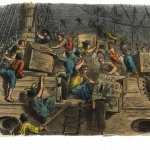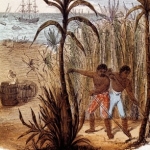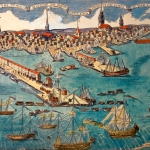Articles in the Featured Category
Featured, Intorelable Acts or Coercive Acts, Timeline of British Acts on America »

The Intolerable Acts also known as Coercive Acts were a package of five laws implemented by the British government with the purpose of restoring authority in its colonies. The first four Acts were passed as reprisal for the rebellion against the that led to the Boston Tea Party Protest.
The Intolerable Acts were a reprisal to the Boston Tea party rebellion.
The first act was The Boston Port Act which came into effect on March 31, 1774; it closed the port of Boston until the East India Tea company was repaid …
Featured, Quartering Act, Timeline of British Acts on America »

The first in the series of Quartering acts passed by the British parliament. Also known as the American Mutiny Act, The Quartering Act of 1765 was passed on May 3rd, 1765 and required colonial assemblies to provide housing, food and drink to British troops stationed in their towns with the purpose of improving living conditions and decreasing the cost to the crown. This act was implemented by General Tomas Gage, the commander in chief of North America. Soldiers were to be housed in barracks or empty public buildings and not …
Featured, Sugar act, Timeline of British Acts on America »

Definition of Sugar Act
The American Revenue Act of 1764, so called Sugar Act, was a law that attempted to curb the smuggling of sugar and molasses in the colonies by reducing the previous tax rate and enforcing the collection of duties. It added several products such as hides, skins and potash to the list of enumerated commodities that could be legally exported under the . It was introduced by the new British Prime Minister, George Grenville. The 1764 Sugar Act amended the existing
Purpose of the Sugar Act
The goal of this …
Featured, Navigation Acts, Timeline of British Acts on America »

By the early 1620s as Britain was coming out of severe recession, merchants and politicians started discussing trade policy. They came to the conclusion that in order to be a healthy nation their exports should exceed their imports and the balance should be invested in military strength. Their fiercest and strongest competitor was the Dutch who dominated the navigation trade. In 1650 parliament passed an ordinance forbidding any foreign ships in British colonies.
Colonial Trade in the 1660s.
The following year parliament, under the leadership of Oliver Cromwell, passed the first of …


